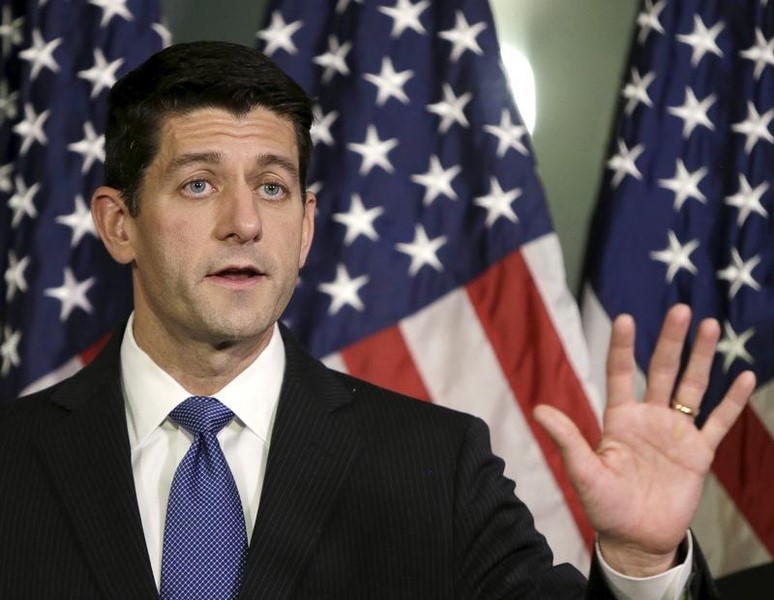By Patricia Zengerle and Megan Cassella
WASHINGTON (Reuters) - U.S. lawmakers called on Tuesday for even tighter scrutiny of Syrian refugees fleeing to the United States as last week's deadly Paris attacks recast America's long-running debate over immigration and national security.
Republican leaders in the U.S. House of Representatives, worried about Islamist attacks following Friday's killings of 129 people in France, threatened to suspend President Barack Obama's efforts to allow 10,000 more Syrian refugees into the country.
Democrats also called for close vetting of refugees from the four-year-old civil war in Syria in case they are linked to extremist groups such as Islamic State, which claimed responsibility for the Paris killings.
The attacks focused the spotlight in Washington on national security with the November 2016 presidential election campaign heating up and Obama in the final year of his presidency.
"This is a moment where it is better to be safe than sorry," the Republican House Speaker Paul Ryan told reporters.
Separately, two influential senators, Republican Jeff Flake and Democrat Tim Kaine, responded to the Paris attacks by renewing their push for Congress to vote on a formal authorization for the use of military force for the campaign against Islamic State.
But most of the emphasis in the Republican-controlled Congress has been on the backlash against Syrian refugees.
Ryan called for a pause in Obama's program, announced in September, to accept 10,000 Syrian refugees in a year. The number of Syrians destined for the United States is low compared with figures in European countries such as Germany.
The issue has challenged America's image of itself as a nation that welcomes downtrodden newcomers, with some lawmakers suggesting all Syrians should be barred, or that Christian Syrians should be favored over Muslims.
Republican Senator John McCain on Tuesday backed scrupulous vetting but strongly opposed such discrimination.
"All of us are God's children ... so I disagree with that assumption that only Christian children should be able to come to the United States," he told Reuters.
Republicans and Democrats have both voiced fears that housing refugees from a conflict zone in the Middle East could leave the country open to attacks like those staged by al Qaeda on Sept. 11, 2001.
Senator Ben Cardin, the ranking Democrat on the Foreign Relations Committee, said Washington should look at the strongest possible vetting process to ensure "terrorists cannot get into the United States through our refugee program."
The current U.S. screening process takes 18 to 24 months and is tighter than that in Europe, he said.
Other Western countries have begun to question their willingness to admit Syrians after reports that at least one of the Paris attackers passed through Greece in October.
The White House National Security Council said it was continuing to look for ways to tighten screening.
Senior Obama administration officials including Homeland Security Secretary Jeh Johnson held a classified briefing on Tuesday evening for all 435 members of the House about the aftermath of the Paris attacks. But many Republicans remained deeply concerned.
"I have great concerns about allowing people on our shores without knowing that we're able to find out information about them," said Republican Representative Matt Salmon. "I'm leaving this briefing far less comfortable than when I came in."
IMMIGRATION FIGHTS
U.S. politicians have debated for years over immigration, most recently about Latin Americans who entered the country illegally.
Conservative Republicans in the 2016 White House race are offering competing plans to limit illegal immigration. Republican presidential campaign front-runner Donald Trump has threatened to deport the 11 million already in the United States.
Republican presidential candidate Jeb Bush broke with rivals by saying he would support the entry of some Syrian refugees but stressed that screening must be tough enough to bar militants.
Worrying refugee advocates, at least 26 mostly Republican governors say they are concerned about people resettling in their states after fleeing Syria's four-year-old civil war, saying some could be associated with Islamic State. Other governors, mostly Democrats, have said Syrians are welcome.
Secretary of State John Kerry said that of 785,000 refugees accepted since 2001, only 12 "were found to perhaps be problematic with respect to potential terror."
But he told NBC that while screening is effective it will have to be increased and "will probably go slower and cost more money."
Ryan did not offer details about proposed legislation to pause Obama's refugee plan, but said in an interview with the Wall Street Journal that he would bring it to the House floor on Thursday.
He said he had spoken to the White House, congressional Democrats and senators about the bill.
Several other Republicans are pushing to include a provision to block the resettlement of Syrians in a trillion-dollar budget bill that must be passed, and signed into law by Obama, by Dec. 11.
Others have proposed measures setting strict conditions on admitting Syrians, such as requiring the FBI director to certify that refugees' background checks have been completed, and an audit of the vetting process.
The Senate, where Republicans hold a smaller majority than in the House, would also have to approve any legislation before it could take effect. Rhetoric there has been less heated than in the House.

A plan by Canadian Prime Minister Justin Trudeau to accept 25,000 Syrian refugees by the end of the year ran into trouble on Monday as some local leaders said the timeline is too short.